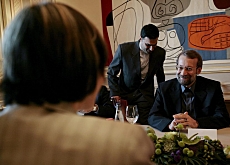
Negotiation key to Iranian crisis say Swiss

Foreign Minister Micheline Calmy-Rey has once again offered Switzerland's assistance to find a negotiated outcome to the Iranian nuclear crisis.
Calmy-Rey repeated the offer during talks on Saturday in Bern with Iran’s chief nuclear negotiator, Ali Larijani, who has been meeting European leaders over the past few days.
“Switzerland favours a negotiated solution to the nuclear dossier and is willing, if requested, to provide its support compatible with its means,” said the foreign ministry in a statement issued after the meeting.
The foreign ministry also reaffirmed Switzerland’s commitment to nuclear non-proliferation and disarmament, but added that every state had the right to make peaceful use of nuclear energy.
Laranjani said after the meeting that he hoped Switzerland would contribute to a diplomatic solution of the crisis, adding that it was important to prepare “the path towards a solution for the problems of [the Middle East] region.”
The Iranian official said that the Swiss had always held a “correct and balanced position” on international and regional matters. He would not comment on possible Swiss contributions towards to stopping the ongoing crisis.
Larijani’s visit was ostensibly to inform Calmy-Rey of the Iranian government’s position on the nuclear dossier.
But Switzerland has represented American interests in Tehran since 1981. The United States and Iran broke off diplomatic relations in 1980 after students took US embassy staff hostage.
Calmy-Rey had already met the Iranian foreign minister, Manouchehr Mottaki, in Bern on June 22, calling at the time for a negotiated solution to the crisis.
Dialogue
Tehran has asserted repeatedly that its nuclear activities are peaceful and aimed at generating power. But the US and the European Union fear the research programme is a cover for the development of nuclear weapons.
To end the standoff, the five permanent members of the United Nations Security Council plus Germany have offered Iran a state-of-the-art nuclear reactor with a guaranteed fuel supply, economic benefits and other incentives if it halts uranium enrichment.
Larijani has said that the West’s pressure for a quick response to the offer is not helpful, but insisted that the standoff can still be resolved through dialogue.
“We do not accept preconditions. The discussions must be open. All questions or ambivalences should be solved by negotiations. We don’t understand why people are drawing lines there,” he told Swiss television.
In an interview with the Sonntagsblick newspaper, Iran’s ambassador to Switzerland has confirmed that his country would not give a final reply to the proposal before August. “We need that time to assess the proposal without reservations,” said Majid Takht Ravanchi.
Larijani has suggested Europe could enhance Iranian confidence in the nuclear talks by ending restrictions on exports of some modern industrial equipment to Iran. “There are many areas in which confidence can be created,” he said.
Javier Solana, the EU’s foreign policy chief, travelled to Tehran last month with the offer of incentives if Iran agrees to halt its uranium enrichment program and return to negotiations.
On Thursday, Larijani met with Solana in Brussels and said his country remains “serious” about continuing discussions to defuse the standoff. The two men are expected to talk again this week.
swissinfo with agencies
Switzerland has represented US interests in Iran since 1981.
Pakistan fulfils a similar role for Iran in Washington.
Iran is Switzerland’s third biggest export market in the Middle East after the United Arab Emirates and Saudi Arabia.
Swiss exports there totalled over SFr747 million in 2005, while imports were only a little more than SFr53 million.

In compliance with the JTI standards
More: SWI swissinfo.ch certified by the Journalism Trust Initiative


























You can find an overview of ongoing debates with our journalists here . Please join us!
If you want to start a conversation about a topic raised in this article or want to report factual errors, email us at english@swissinfo.ch.